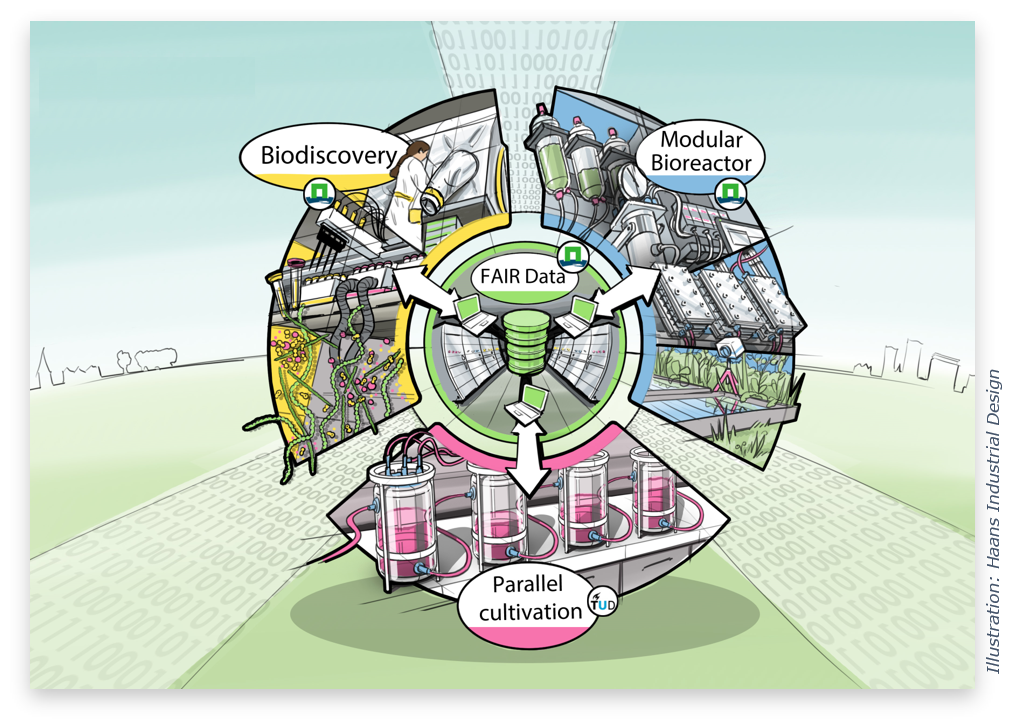Together with Wageningen University & Research and the Delft University of Technology, the Dutch Research Council (NWO) will invest almost 25 million euros in research facility UNLOCK to study mixed microbial communities and their application. The research facility was approved and consists of equipment and human resources that will be used to gather knowledge on micro-organisms effectively.
By the UNLOCK team / 30 april 2020
KEY MESSAGES
- Although microbes are natural team players, scientists have investigated only a small number of individual microbial species so far
- The research facilities of UNLOCK enable the discovery of new microbes and research on mixed microbial teams
- Wageningen University and Research and the Delft University of Technology have joined forces by combining their expertises in four complementary research platforms
- UNLOCK is funded by NWO (Dutch Research Council)
Micro-organisms are natural team-players. They are essential in processes such as a healthy metabolism, purifying contaminated water and environment, stimulating plant growth and the preparation of foods such as cheese or beer through the process of fermentation. However, even though natural and man-made ecosystems are characterized by an enormous microbial diversity, research on microbial communities and their application in biotechnological processes historically has been conducted with a very limited number of strains isolated from these ecosystems. We are currently using no more than one per cent of the microbiological potential.
Delighted
Wageningen and Delft have launched the new research facility UNLOCK to study mixed microbial cultures extensively. Various sub-areas of research will be integrated through UNLOCK. This development has been eagerly awaited by researchers studying mixed microbial cultures. This integration will make significant scientific and societal breakthroughs possible. The NWO’s approval will make a 14.5 million euro funding available for the next decade. Ten million euros are earmarked for the Wageningen contribution. A total of 24.8 million euros will be invested in UNLOCK. Lead petitioner, Prof. Hauke Smidt is delighted at the approval. ‘This is fantastic. UNLOCK opens up entirely new perspectives for the discovery of new micro-organisms and ground-breaking research on mixed microbial cultures’.

UNLOCKing microbial diversity for society
In UNLOCK, Wageningen and Delft have joined forces towards full integration of all relevant fields of expertise in four complementary platforms:
- The Biodiscovery Platform (WUR-Microbiology) allows its users to discover and characterize new micro-organisms. In addition, there is a processing unit that allows for fully automated unlocking of biological samples for biomolecular analysis.
- The Modular Bioreactor Platform (WUR-Environmental Technology) facilitates research for sustainable solutions to environmental issues, such as the degradation of (micro) pollutants, sustainable energy generation and reclaiming resources from complex waste streams.
- With the Parallel Cultviation Platform (TUD-Biotechnology), users can conduct dozens of experiments in bioreactors simultaneously for comparative analysis of how process variables affect system development.
- The FAIR Data Platform (WUR-Systems & Synthetic Biology) takes care of the storage, processing and interpretation of large quantities of data flowing from the experimental systems in a cloud-based infrastructure based on the FAIR principles (Findable, Accessible, Interoperable, Reusable).
The NWO has allocated a total of 93 million euros to seven projects. The Ministry of Culture and Education makes funds available to the NWO for the National Roadmap for a Large-scale Scientific Infrastructure. These funds enable the building and overhaul of essential research infrastructures. The honoured scientific infrastructures are of critical importance to innovative scientific research, and as a stimulus for economic and societal innovations across all scientific disciplines.
